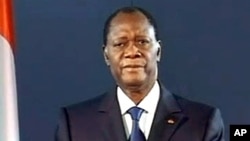Fighters loyal to Ivory Coast's internationally-recognized president are blockading the compound of the country's incumbent leader, who is refusing to give up power. U.N. human rights investigators say they have found more than 100 bodies that appear to be victims of ethnic killing.
After days of fighting to drive incumbent leader Laurent Gbagbo from an underground bunker, Ivory Coast's internationally-recognized president Alassane Ouattara has decided to leave him there.
Ouattara says Gbagbo has entrenched himself at the presidential compound with heavy weapons and mercenaries, so a blockade has been established around the perimeter to secure the neighborhood.
No martyrs
Ouattara officials say they concluded that Gbagbo could not be taken alive, and they do not want him to die a self-proclaimed martyr for democracy.
"We cannot give this luxury to Gbabgo, to be a martyr," said Youssoufou Bamba, Ouattara's U.N. ambassador. "He will be captured alive. He will be well and alive and respond before justice the crime he has committed."
Human Rights Watch says Gbagbo loyalists have carried out a campaign of violence against Ouattara supporters since election results were released in December. Gbagbo officials say Ouattara forces killed Gbagbo supporters during fighting in western provinces last week.
Bodies found
U.N. human rights investigators say they have found more than 100 bodies in the past 24 hours, some of whom appear to be victims of ethnically-motivated violence. U.N. High Commissioner for Human Rights spokesman Rupert Colville says 40 bodies discovered west of the town of Duekoue appear to have been killed by Liberian mercenaries.
U.N. Emergency Relief Coordinator Valerie Amos visited the area.
"Two hundred bodies in one site," Amos said. "Other sites where there are clearly bodies, but we don't know how many. I was taken for example to a well, and there are bodies down that well. So I don't know what the final figures will turn out to be."
The International Criminal Court says there can be no amnesty for crimes committed during Ivory Coast's political crisis. Ouattara is promising a full investigation into human rights violations and says all those responsible will be punished.
Taking charge
With Gbagbo barricaded in the presidential compound, Ouattara is moving to take charge of Ivory Coast.
He is asking the European Union to lift sanctions on the ports of Abidjan and San Pedro and certain public utilities that were imposed because of the illegitimate nature of Gbagbo's rule.
The European Union says it hopes to begin easing those sanctions soon.
Ouattara is asking the minister of mines and energy to restart Abidjan's refinery and ensure a steady supply of fuel. He is calling on security forces previously loyal to Gbagbo to ensure the safety of commerce and the delivery of food to markets and medicines to health centers.
He is also asking the West African central bank to reopen its branches in Ivory Coast so commercial banks can resume operations and pay salaries as soon as possible.
Displaced
More than 300,000 civilians are displaced within Abidjan alone, many of them unable to look for food and water over the past week because of the fighting. With water running low, relief officials are bracing for a possible cholera outbreak.
U.N. Emergency Relief Coordinator Valerie Amos says relief agencies also need more help for Ivorian refugees at camps across the Liberian border.
"With more money, we can deliver more food, provide shelter, offer better medical treatment to those who are sick and much more," she said. "And I'm concerned that when the rainy season starts, which is not too far away, getting the aid in is going to be even more difficult than it is now, because there are serious logistical and transport problems."
U.N. relief agencies are asking for the establishment of humanitarian corridors inside the country and across its borders to allow safe access to thousands of people who have fled the fighting.
View related slide show




